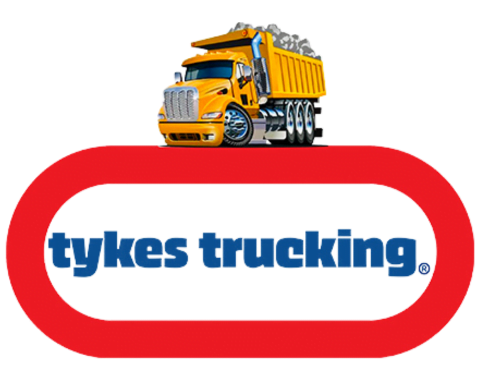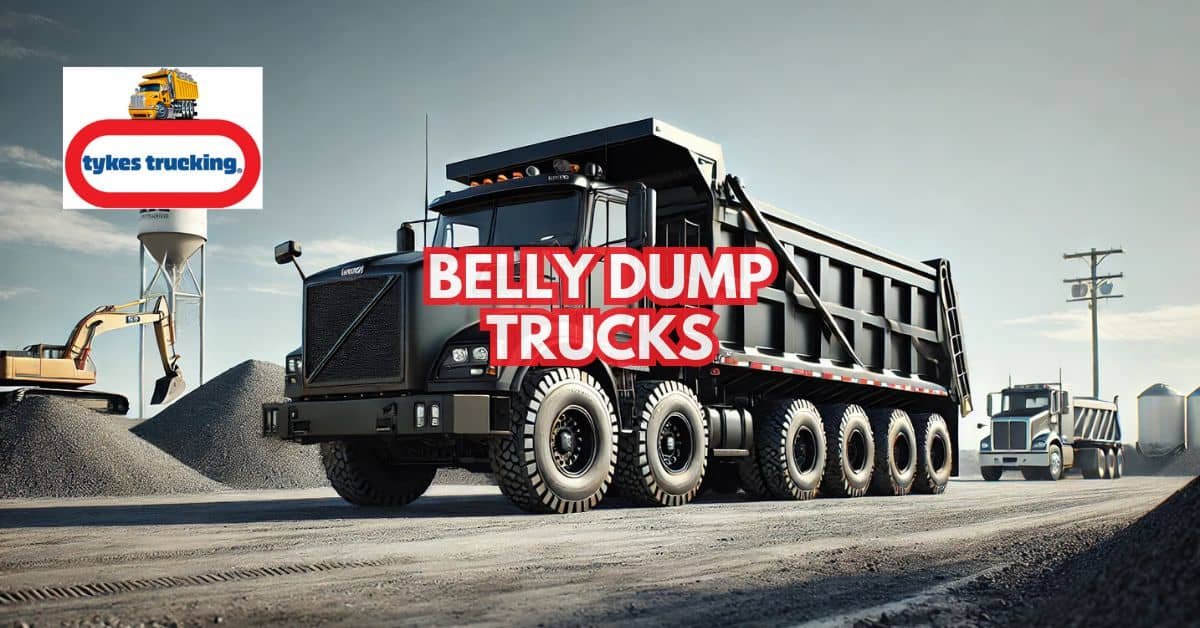Belly dump trucks and traditional dump trucks are both used for transporting materials like gravel, sand, and dirt.
Although they serve similar purposes, their design and unloading processes differ significantly.
Each type of truck has advantages depending on the task at hand, making them suitable for different jobs.
Choosing between the two can impact efficiency, safety, and costs, so it’s important to understand how they work.
We’ll break down the differences and benefits of each to help you make the right choice for your project.
1. Design and Structure: Understanding the Differences
Belly dump trucks have a unique design that allows them to release material from the bottom of the trailer.
This design enables the material to be spread in a long, controlled line as the truck moves.
Traditional dump trucks, on the other hand, typically feature a bed that lifts to release material from the rear or side.
The overall structure of belly dump trucks is longer, making them more effective for roadwork but less suited to tight spaces.
Meanwhile, traditional dump trucks have a more compact design, making them easier to maneuver in confined areas like construction sites.
🚚 Choosing the Right Dump Truck Trailers: Key Features You Shouldn’t Overlook
2. How Dumping Mechanisms Vary Between Truck Types
Belly dump trucks release their load by opening a gate at the bottom of the trailer, letting gravity do the work.
This type of unloading spreads material in a consistent layer, which is ideal for tasks like road paving.
Traditional dump trucks, however, use a hydraulic lift to tilt the truck bed, allowing material to pour out from the back or side.
This method allows for more precision in unloading specific amounts but may result in piles that need to be spread later.
The way each truck dumps material influences the speed, accuracy, and convenience of unloading.
🚚 The Power of the 12-Wheel Dump Truck: Revolutionizing Construction and Hauling
3. Loading Capacity: Which Truck Can Haul More?
Traditional dump trucks tend to have a larger hauling capacity compared to belly dump trucks.
Some traditional dump trucks can carry heavier materials, like large rocks or debris, due to their more robust build.
Belly dump trucks typically carry lighter materials and may have slightly smaller capacity limits.
However, belly dump trucks are better suited for frequent unloading over long distances, as they don’t have to stop to dump their load.
Depending on the material and frequency of trips, one truck might save more time and energy than the other.
🚚 Unveiling the Freedom of Flatbed Truck Campers: Adventure Unbound
4. Versatility in Applications: Belly Dump vs. Traditional Dump Trucks
Belly dump trucks are particularly versatile for jobs that require spreading materials over long distances, such as road construction or laying down gravel.
Their ability to unload while moving makes them ideal for evenly distributing material across a wide area.
Traditional dump trucks are more suited for tasks where precise placement of material is needed, such as in construction sites or for filling holes.
They can handle a wider range of materials and are better for projects that involve multiple stops and varied terrains.
Depending on the task at hand, each truck type offers unique benefits in terms of versatility.
🚚 Why Choose a 5-Ton Dump Truck for Your Next Project?
5. Efficiency and Speed: Which Truck Unloads Faster?
Belly dump trucks generally unload materials faster because they can release their load while driving forward.
This method saves time, especially on large, flat job sites where continuous spreading is needed.
In contrast, traditional dump trucks must stop to raise the bed and dump the material, which can slow down the process.
While traditional dump trucks can provide more precise drops, their slower unloading process can make them less efficient for large-scale jobs.
For projects focused on speed, belly dump trucks often come out ahead.
🚚 6-Wheel Dump Truck Safety: Best Practices for Operators
6. Stability and Maneuverability: Performance on Different Terrains
Traditional dump trucks perform better on uneven or rugged terrain due to their more compact and balanced design.
Their lower center of gravity makes them more stable when carrying heavy loads across rough ground.
Belly dump trucks, while stable on flat surfaces, may face challenges on steep or uneven terrain because of their longer, bulkier structure.
This can make them harder to control when fully loaded or when driving on hills.
When working on challenging terrains, stability and maneuverability are key, giving traditional dump trucks an edge.
🚚 How Choosing the Right Dump Truck Body Maximizes Efficiency: Beyond the Box
7. Material Types: What Each Truck Can Transport
Belly dump trucks are ideal for transporting and spreading loose materials like sand, gravel, or asphalt, making them highly effective for roadwork.
They’re designed for lightweight and medium-weight materials that need to be evenly distributed.
Traditional dump trucks, with their stronger build, can handle a wider range of materials, including heavier items like rocks, dirt, and debris from construction or demolition sites.
They are more versatile when it comes to hauling loads that vary in size and weight.
The type of material you need to move will determine which truck best fits the job.
🚚 Landscaping Hauling Services in Marikina: How to Choose the Right Provider for Your Needs
8. Operational Costs: Analyzing Expenses for Both Truck Types
Belly dump trucks often have lower operational costs because they can unload quickly and reduce fuel consumption by staying on the move.
Their efficiency in spreading materials also saves labor costs, as fewer workers are needed to spread the load manually.
Traditional dump trucks, on the other hand, may have higher fuel and maintenance costs, especially when used on uneven terrain or for frequent stops.
Hydraulic systems used for lifting the bed in traditional dump trucks can also require more frequent maintenance.
When comparing expenses, belly dump trucks may offer cost savings for larger, long-distance jobs, while traditional dump trucks may be more economical for heavier-duty work.
🚚 How to Choose the Right Hauling Services in Cainta for Your Project
9. Safety Features: Protecting Operators and Loads
Belly dump trucks provide increased safety during unloading since they don’t need to lift their beds, reducing the risk of tipping over.
Unloading while moving also reduces the strain on the truck’s hydraulics and the chance of accidents caused by unstable loads.
Traditional dump trucks, however, have more potential for tipping if the ground is uneven or the load is unbalanced.
Both types of trucks come with safety mechanisms like backup alarms and cameras, but the belly dump’s design inherently lowers the risk of accidents during dumping.
Safety considerations are important, especially when working on sites with unstable ground or heavy materials.
🚚 Understanding the Benefits of a 5 Yard Dump Truck for Your Construction Projects
10. Choosing the Right Truck: Factors to Consider for Your Project
When deciding between a belly dump truck and a traditional dump truck, several factors should be considered.
These include the type of material, the job site’s terrain, the need for precision in unloading, and the overall project size.
Belly dump trucks are ideal for large, flat job sites where material needs to be spread quickly and evenly, while traditional dump trucks are better suited for projects requiring precise drops or working on rough terrain.
Costs, safety, and operational needs should also be factored in to ensure the right choice.
Matching the truck to the specific demands of your project will lead to better efficiency and results.
🚚 Unpacking the Capabilities of Dump Truck Beds: The Workhorse Workbeds
💡 Conclusion
Both belly dump trucks and traditional dump trucks have strengths depending on the job.
Belly dump trucks offer faster unloading and are great for spreading material over large areas, making them perfect for roadwork or projects that require consistent distribution.
Traditional dump trucks, with their versatility and stability, are better suited for a variety of terrains and heavier materials.
Ultimately, the best choice depends on your project’s specific needs, whether it’s speed, precision, or terrain adaptability.
Understanding the advantages of each will help you make the most informed decision.
😉 Our Services
Tykes Trucking Services specializes in delivering aggregates and providing reliable hauling services for all your project needs.
We ensure fast and efficient transport of materials like gravel, sand, and more.
Our team is committed to meeting your timelines with professional service you can trust.
Contact us at 09175435019, through our Facebook page, or via the site’s contact form for more information.
Let Tykes Trucking Services handle your hauling needs with ease and efficiency!

